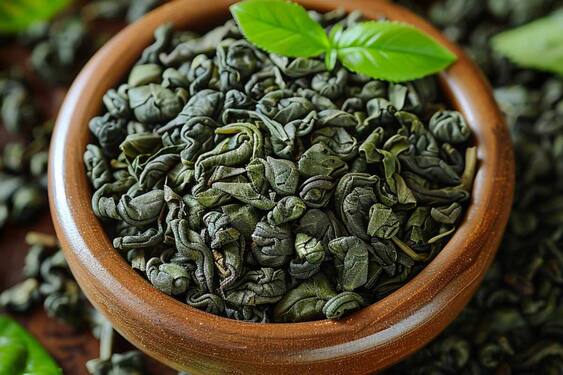How Tea Leaves Can Boost Your Heart Health And Reduce Disease Risk
Tea leaves are packed with antioxidants that support heart health, improve brain function, and aid in weight loss. They promote a healthy gut, boost immunity, and may reduce the risk of cancer. Additionally, tea improves skin health and strengthens bones.

Tea leaves, especially from the Camellia sinensis plant, are rich in antioxidants like polyphenols, which protect against oxidative stress and chronic diseases. They improve heart health by lowering cholesterol, enhance brain function due to caffeine and L-theanine, and support weight loss by boosting metabolism. Tea promotes gut health by fostering beneficial bacteria and supports immune function by enhancing antibody production. The catechins in green tea may also reduce the risk of cancer and help regulate blood sugar levels. Additionally, tea benefits skin health by preventing oxidative damage and may strengthen bones, reducing the risk of osteoporosis.
1. Rich in Antioxidants
Tea leaves are loaded with antioxidants, primarily polyphenols like catechins (in green tea) and theaflavins (in black tea). These antioxidants help neutralize harmful free radicals in the body, reducing oxidative stress. This can prevent cellular damage, slowing down the aging process and lowering the risk of chronic diseases such as cancer and heart disease.
2. Improves Heart Health
Regular consumption of tea has been associated with improved heart health. Tea leaves contain flavonoids, which have been shown to lower LDL cholesterol (the "bad" cholesterol) and improve blood vessel function. By reducing cholesterol levels and improving circulation, tea can help lower the risk of heart attacks and strokes. Some studies suggest that drinking tea regularly may reduce the risk of cardiovascular disease by up to 20%.
3. Boosts Brain Function and Mental Clarity
Tea leaves contain caffeine and L-theanine, two compounds that can boost brain function. Caffeine is a known stimulant that improves focus, attention, and alertness by blocking the inhibitory neurotransmitter adenosine. L-theanine, on the other hand, promotes relaxation without causing drowsiness. Together, they enhance cognitive function, improve mood, and increase mental clarity. Green tea, in particular, has been linked to better memory and attention span due to the synergistic effects of caffeine and L-theanine.
4. Supports Weight Loss and Metabolism
Tea leaves, especially green tea, are well-known for their ability to promote weight loss. The catechins in green tea, particularly EGCG (Epigallocatechin gallate), have been shown to increase fat burning, especially during exercise. Tea can also boost metabolism by enhancing thermogenesis (the process by which the body generates heat and burns calories). Drinking tea regularly may aid in weight management and reduce body fat over time.
5. Enhances Gut Health
Tea contains polyphenols that promote the growth of beneficial gut bacteria. These compounds act as prebiotics, supporting the growth of probiotic bacteria like Bifidobacteria and Lactobacillus. A healthy gut microbiome is essential for digestion, nutrient absorption, and immune function. Additionally, tea polyphenols may help reduce the growth of harmful bacteria, improving overall gut health and preventing digestive issues such as bloating and indigestion.
6. Reduces the Risk of Cancer
The antioxidants in tea leaves, particularly catechins in green tea, have been studied for their potential cancer-preventive properties. These compounds help protect cells from DNA damage caused by free radicals, which can lead to cancer development. Tea polyphenols have been shown to inhibit the growth of cancer cells and reduce the risk of certain cancers, including breast, prostate, and colorectal cancer. While more research is needed, regular tea consumption is considered beneficial for cancer prevention.
7. Supports Immune Function
Tea leaves are rich in bioactive compounds that can enhance immune function. The polyphenols and amino acids found in tea help to increase the production of antibodies and activate immune cells, such as T cells. Drinking tea regularly may help the body fend off infections and reduce the severity of illnesses like the flu or common cold. Some studies suggest that green tea catechins can inhibit the replication of viruses, further supporting immune defense.
8. Lowers Blood Sugar Levels
Tea, particularly green and black varieties, has been shown to help regulate blood sugar levels. The polyphenols in tea help improve insulin sensitivity and reduce blood sugar spikes after meals. This makes tea beneficial for people with type 2 diabetes or those at risk of developing the condition. Drinking tea regularly can support overall blood sugar control and reduce the likelihood of developing complications associated with diabetes.
9. Promotes Skin Health
The antioxidants in tea leaves can also benefit the skin. EGCG in green tea, for example, helps protect the skin from damage caused by UV rays and pollution. It can reduce inflammation, prevent oxidative damage, and even slow down the appearance of wrinkles and other signs of aging. Tea leaves also contain vitamins like vitamin C and vitamin E, which nourish the skin and promote a healthy complexion.
10. Improves Bone Health
Tea consumption has been associated with improved bone density and a lower risk of osteoporosis. The flavonoids in tea help protect bone cells from damage and increase mineral density. Studies have found that long-term tea drinkers tend to have stronger bones, which can reduce the risk of fractures, particularly in older adults. Tea leaves may also contain small amounts of fluoride, which helps strengthen teeth and bones.
Conclusion:
Tea leaves are a potent source of antioxidants, vitamins, and minerals that provide various health benefits. From enhancing heart and brain health to supporting digestion, weight loss, and skin health, regular tea consumption can significantly contribute to overall wellness. Whether it's green, black, or any other variety, tea can be a healthy addition to your daily routine.
